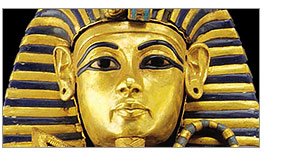
The King Tut Exhibit opens in Chicago today at the Field Museum.
Coptic Christians, an ancient but now persecuted religious minority in Egypt, gathered in front of the museum to draw attention to their plight. Tribune:
"We need to be recognized as people and we need to be heard," Atef MacKar said. "It is important to show that we are the Copts, we are sons and daughters of King Tut and we will not tolerate seeing our sisters and brothers persecuted in Egypt."
The demonstrators are members of Coptic churches in the Chicago area:
Discrimination and human rights abuses against Coptic Christians remain widespread in Egypt, according to a report released this month by the U.S. Commission on International Religious Freedom. Copts face societal intolerance, and Egyptian authorities have been accused of being lax in protecting their rights.No Christians serve as governors, presidents or deans of public universities, and very few Christians hold positions in the upper ranks of the security services and the armed forces, Coptic community leaders said. A 14th Century law bars Christians not only from building new churches, they said, but also from performing necessary maintenance on structures without government approval.
Last year Secretary of State Condoleezza Rice, in a break from past American policy, strongly made the case for democracy in Egypt and the Middle East. CNN:
In her speech, delivered to 1,000 invited attendees, Rice said she visited Cairo "not to talk about the past, but to look to the future, to a future that Egyptians can lead and define.""Throughout the Middle East, the fear of free choices can no longer justify the denial of liberty," she said. "It is time to abandon the excuses that are made to avoid the hard work of democracy."
After the speech, Rice was to meet with civil society activists and opposition leader Ayman Nur, leader of the Ghad party. In March, Rice canceled a trip to Egypt after Nur was jailed.
The status quo, leftist apologists at the BBC were appalled at the time. In a setback, Egypt has since postponed local elections after Hamas won in Palestine, so there is more work to be done. Interestingly though, Egyptian judges are emboldened enough to demonstrate in favor of judicial independence. In its latest foreign aid bill, the House approved funding for Egypt, but continued to withhold some funds until Egypt meets some important benchmarks.
UPDATE: Marathon Pundit has an excellent post here highlighting the case of an Egyptian blogger who has been arrested for peaceful demonstrations.


No comments:
Post a Comment